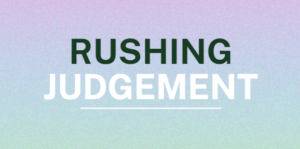
In a world that moves at the speed of light, where information flows ceaselessly through our screens and devices, it’s easy to fall into the trap of rushing to conclusions. We’re bombarded with headlines, tweets, and soundbites, each vying for our attention and often demanding an immediate reaction. But in this whirlwind of data, there lies a crucial skill that is often overlooked: understanding the context before forming judgments.
Context is the backdrop against which events unfold, the nuances that shape meaning and understanding. Without it, our interpretations can be shallow, misguided, or even entirely incorrect. Yet, in our fast-paced society, taking the time to delve into context is often seen as a luxury we can’t afford. We’re encouraged to form opinions quickly, to keep up with the relentless pace of information consumption.
But what do we lose when we skip over context in our rush to judgment?
Firstly, context provides depth. It’s the difference between seeing a single puzzle piece and understanding how it fits into the larger picture. Without context, we risk missing vital pieces of information that could completely change our understanding of a situation. Take, for example, a controversial statement made by a public figure. Without considering the historical, cultural, and personal background of that individual, our interpretation may be skewed or incomplete.
Rushing to conclusions without understanding context can lead to misunderstanding and conflict. How many arguments have erupted because of misinterpretations or assumptions made without the full story? In personal relationships, in politics, and in international affairs, the failure to consider context can have far-reaching consequences. By taking the time to understand the broader context, we open the door to empathy, collaboration, and genuine understanding.
Furthermore, context fosters critical thinking. It encourages us to question, to probe beneath the surface, and to consider alternative perspectives. When we rush to conclusions, we often rely on preconceived notions or biases, rather than engaging in thoughtful analysis. But by immersing ourselves in the context, we cultivate a more nuanced and informed approach to problem-solving.
So, how can we resist the temptation to rush to conclusions and instead embrace the richness of context?
Firstly, we must acknowledge our limitations. None of us are omniscient, and none of us have access to the full context of every situation. Recognizing this humbling truth can encourage us to approach information with curiosity rather than arrogance.
Secondly, we can cultivate the habit of seeking out context. This may involve digging deeper into news stories, consulting multiple sources, or engaging in conversations with those directly involved. It requires patience and effort, but the rewards are well worth it.
Lastly, we must be willing to revise our conclusions in light of new information. Context is dynamic, constantly evolving as new facts come to light. By remaining open-minded and adaptable, we can ensure that our judgments are grounded in reality rather than speculation.
In a world that values speed and efficiency above all else, it’s easy to overlook the importance of context. But by slowing down, by taking the time to understand the complexities of the world around us, we can cultivate a deeper, more meaningful understanding of the issues that shape our lives. So let’s resist the urge to rush to conclusions and instead embrace the beauty of context.
Recommended Reading:
Unlocking the Power of Perplexity AI: Why Recruiters Should Utilize This Revolutionary Tool
Exploring AI Interviewing Assessment Tools: A Comprehensive Review
PartyRock a Sandbox for Talent Sourcing
- AI Search Will Transform Talent Sourcing Forever - January 10, 2025
- Build an AI Sourcing Assistant using ChatGPT 4 - January 10, 2025
- Top Recruiting Leaders to Follow in 2025 - January 8, 2025
